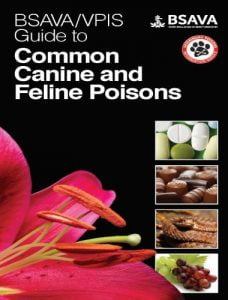VPIS Guide to Common Canine and Feline Poisons
by BSAVA / VPIS
This book contains brief summaries of information relating to poisoning of cats and dogs by commonly
 encountered substances. For each agent, information is given on toxicology, clinical effects, appropriate first aid and subsequent management and prognosis. This enables veterinary professionals to give appropriate guidance to clients that suspect their animals may have been poisoned.
encountered substances. For each agent, information is given on toxicology, clinical effects, appropriate first aid and subsequent management and prognosis. This enables veterinary professionals to give appropriate guidance to clients that suspect their animals may have been poisoned.
A traffic light system indicates the level of concern and urgency (see ‘How to use this guide’ page viii).
These summaries are NOT written with the aim of providing comprehensive advice about the management of any case. Many factors can influence how a case progresses and may affect management recommendations (dose, route(s) of exposure, time since exposure, duration of exposure, past medical history, breed or species susceptibility, environment, location, etc.).
For this reason these summaries should not be the sole information resource used to manage a poisoning case referred to a practice for treatment. The inclusion of substances was determined by a review of enquiries made to VPIS and their case outcomes (where known).
Download: Canine and Feline Endocrinology 4th Edition
■ We have included substances of low or negligible toxicity about which VPIS receives many enquiries and for which presentation to a veterinary surgery is unlikely to be necessary.
■ Other agents have been included owing to the number of exposures in the past and where the outcome has been variable.
■ A few agents have also been included where exposures are relatively rare but toxicity is high and for which management may need to be speedy, complex or intensive, and where prognosis should be guarded. These latter categories are instances where reference to a veterinary poisons information service is strongly advised.
-
- Book Name: VPIS Guide to Common Canine and Feline Poisons
- Year Published: January 2012
- File Type: PDF
- Download: Link
- Size: 10 MB
- Password: PDFLibrary.Net
